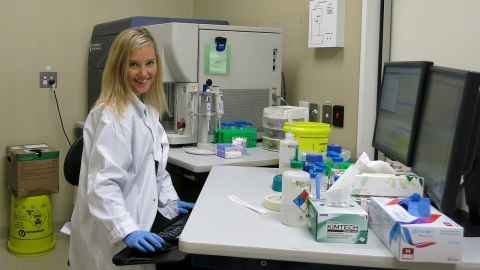Take 10 with... Anna Brooks
Dr Anna Brooks is a Research Fellow and Flow Cytometry Manager in the School of Biological Sciences and the Maurice Wilkins Centre for Molecular Biodiscovery. She gives us 10 minutes of her time to discuss lymph nodes, lasers, and landing a permanent job in research.

1. Describe your research topic to us ten words or less.
Characterising the diversity of mesenchymal precursor/ progenitor cells in human tissues.
2. Now describe it in everyday terms!
In technical terms, I apply my skills as an experienced ‘flow cytometrist’ to better understand the diversity of cell types present in adult tissues, including immune cells, but more recently, those that have the ability to self-renew and therefore regenerate new tissue. These cells are known as mesenchymal precursor or progenitor cells but are also referred to as ‘mesenchymal stem cells’, however the jury is still out as to whether this widely used terminology is appropriate.
These cells are ‘hot’ right now as they’re not only important in normal tissue maintenance and repair, but they’ve attracted a lot of interest for their potential use in regenerative medicine. In addition, they also may be involved in helping or hindering tumour cell escape in the context of cancer. So my interest lies in understanding how these important cells are involved in both health and disease.
What’s flow cytometry? This is a technique that allows us to identify loads of different cell types at the same time, within the same complex cell mixture, such as human blood or digested human tissue (fat, skin). We do this by labelling cells with a bunch of fluorescent tags which are then run through a machine, passing by four lasers that can excite each tag. We are able to detect up to 17 colours in one sample, which makes it a really useful technique for characterising cells in complex human tissues.
3. What are some of the day-to-day research activities you carry out?
A lot of my research involves running flow cytometry experiments, which requires designing panels of fluorescent tags that are specific for or optimised to each type of tissue. The types of tissue I have been working with are human blood, skin, fat, and lymph nodes.
After the lab work much of my time is spent analysing huge, complex data sets with the hope of getting a better understanding of the cell diversity present.
4. What do you enjoy most about your research?
I love to challenge the ‘status quo’ by looking at things from a different perspective, especially by using my skills in flow cytometry in new research areas where it is less commonly employed – with the hope of making new discoveries.
5. Tell us about something that has surprised you or amused you in the course of your research.
That scheduled meeting times are just a guide and rarely stuck to! It is often surprising how much time suddenly disappears when discussing current research problems or nutting out new exciting research ideas.
6. How have you approached any challenges you’ve faced in your research?
It is often challenging to chase an idea that goes against previously published research, knowing that it may take a lot more work to convince those before you that what they originally thought or published, may not be as accurate as they first imagined.
7. What questions have emerged as a result?
From a research perspective, it still remains to be determined whether a true ‘mesenchymal stem cell’ exists in all adult tissues, or whether this terminology should just be dropped altogether. A question I hope to help answer! [InSCIde Scoop note: Yes! We love a definitive answer!]
8. What kind of impact do you hope your research will have?
I hope that by using advanced flow cytometry techniques we can gain a better understanding of these progenitor / precursor cells in many human tissues, which ultimately could influence the regenerative medicine field with respect to which cells may be most useful in therapies.
9. If you collaborate across the faculty or University, or even outside the University, who do you work with and how does it benefit your research?
Flow cytometry lends itself well to enabling collaborations, and therefore I have been involved in a number of projects. I love this aspect of my work as I am always getting involved in new research areas, which is both challenging and rewarding.
I collaborate with microbiologists, immunologists, stem cell biologists, veterinarians (equine research), psychologists and chemists. Most are within the University, some from the Faculty of Medical and Health Sciences, but I collaborate with researchers from other New Zealand universities too. I also work with international companies who conduct their clinical trials here in Auckland.
10. What one piece of advice would you give your younger, less experienced research self?
That a career in research is going to be challenging. Permanent jobs are scarce and so landing one is going to be a long road.